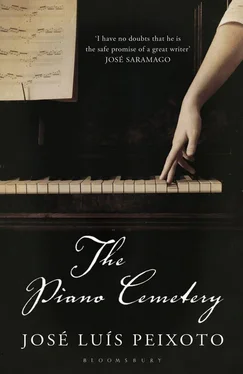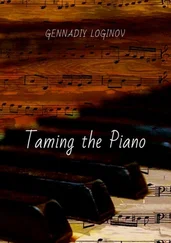because time hurts as it passes. If I could only tell you what you were — what you are still — your face looking at me, not understanding. If only I could tell you everything I was hiding. Me not allowing my fingers to be delicate and pass through the air to touch the lines of your face — the skin of the face that encloses you. I, a criminal. You, kindly, looking at me not understanding. I — you. If only I could tell you all the sorrow I was hiding, and the tenderness, the hurt. If only I could tell you that in everything — in us — time
on Sundays, my father smiled. We were having lunch. My mother had bought fish at the market. My father was complaining about the bones. My mother was turned towards Maria or towards my brother, and she was saying, ‘Don’t eat so quickly.’ I was seven or eight years old and my mother had chosen a piece of fish for me, and with the point of her knife had removed all the bones. Marta was still going out with the guy who is now her husband. It was the third or fourth time he’d had lunch with us. Probably someone was telling a joke, probably someone was telling the story of something that had happened, when Marta choked and started coughing. Her boyfriend got up and began patting her on the back. Marta kept coughing. My mother said to her, ‘Eat a little bit of bread.’ A thread of drool slipped from Marta’s mouth on to her plate. Marta coughed and her face got redder and redder. She stopped coughing, and she remained for a moment with her head lowered. My father asked her if she was better, but she didn’t reply. The boyfriend held her by one arm, his other hand on her shoulder, and he didn’t know what to say. My father said, ‘This fish is useless, it’s nothing but bones.’ My sister started coughing again, and when she managed to spit out the bone her plate was full of spit mixed with blood floating in the oil. As Marta recovered her breathing, my father raised his voice, saying: ‘I did say that this fish was rubbish, it’s money wasted on this complete swindle.’ And he threw the cutlery on to the plate. Shouting, he asked my mother, ‘What went through your head, spending money on this rubbish?’ My mother didn’t reply. My father said, ‘What a swindle, what rubbish.’ My mother continued not to reply. My father grabbed her by the arm, shook her and shouted: ‘Aren’t you listening?’ My mother looked at him, her eyes serious. In a single movement my father took the plate and smashed it on the floor. Shouting, he said, ‘Don’t you look at me like that, you hear me?’ It was that Sunday that my father stopped being ashamed of Marta’s boyfriend. When Marta took him to the door
Kilometre six
to say goodbye, my father’s shouting could be heard from the kitchen and Marta was crying with shame.
the streets I’d written on a bit of board and arrived at her door. I knocked, I waited, I didn’t think of anything. The weight of the toolbox bent my body. The lady’s steps approaching beyond the door — her smile. Going into the corridor I left behind the sun that filled the whole morning, that flooded the streets, that the men and women carried in their faces as they made their way along the pavements, the sun that lit up their certainties and heightened their hope. I slowed down to follow the lady’s slow steps along the hall runner, passing the doorways to rooms full of old pieces of furniture, where whole lives had taken place, and where at that moment there was a tidy silence of coppers, silvers and crystals. We arrived
through Stockholm. Ahead there I can see the beginning of a bridge. The air — this hot air — it’s now completely still. The sun fills up the air. As I approach the bridge, I want to run faster. Behind me, I hear the steps of a runner and I begin to run faster. I look at the bridge down there, I run faster, and when I slow down I can no longer hear anyone pursuing me. The bridge is closer and closer. I manage to make out the people who are at the start of the bridge. I want to get closer to the water because I believe that when I get there the air will be cooler. I put a foot on the bridge — this bridge. I pass by people cheering me on. Voices within cries. Here — the first bridge in this city that’s broken into pieces and linked together by bridges. Here the air isn’t any cooler than it is in Lisbon. The sun burns my skin, the special grease that covers my skin. Behind me I hear the quick steps of another runner. I hear the same voices of the same people cheering him on. And I run
into a huge hall — tall windows behind curtains that reach down to the floor, rugs spread over the waxed wooden floor, armchairs covered with cloths of cornucopias, a chandelier hanging from the ceiling over a thick mahogany table. The lady pointed me towards a piano in one of the corners of the room. There was no need. It was a grand piano. Imposing and antique. I approached, assessing it, admiring it. It was certainly a piano the lady had first known right there, in just this same spot, when she was born — just like her parents, grandparents, great-grandparents — and which would remain there till the end of her days, and beyond and beyond. The gaze of all the generations it had survived would have been enough to wear it down; it was a solid enough piano, however, solemn, eternal, like an old oak. I put down the toolbox, sat on the stool and with a movement of my fingers lifted the lid from the keyboard, removed the cloth that protected the keys, and then after looking at them, after feeling the perfection of their surface, I touched each one. I didn’t need to look behind me to know that the lady had left me alone. I knew solitude too well. It was a problem with the soft pedal. And I was leaning into the inside of the piano when I felt her approach. Her steps were silent on the rug. Her presence was like a clarity that, delicately, expanded and from afar touched my skin with marks which were at once fragile and certain. I said good morning to her. Her startled look replied to me in a whisper almost impossible to hear. In her body a shiver which if you weren’t looking closely could pass unremarked. Her fingers flexed in and out. Her face, maybe curious, maybe concerned, seemed to want to approach — she tried to look inside the piano, and when I caught her she looked at me shyly. At just that moment I knew the piano was an extension of her body. As if to free herself from suffocation she needed to play. There — shy — she could feel any contact, however small, that I had with the piano. That was why I explained to her what the problem was and what I had to do. Smiling, the lady came in. She got between me and her. Without losing her smile, she said, ‘So I see you’ve met my granddaughter.’ Behind her, her face, serene, shy, continued
as fast as I can, as though I was fleeing from the thing that most scared me, as though it was possible to flee from that thing I have inside my skin and which goes with me everywhere, I run
to see me. Her hair, long and smooth, arranged just so. The lips without a speck to spoil the perfection of their lines. The lady asked me what was wrong with the piano. I stopped listening to myself as I explained all the unnecessary words I was saying, and just watched her over the lady’s shoulder, just imagined the world of peace that existed
as fast as I can, as though I could leave myself behind, as though I could run so fast that in an instant I could come free from myself and leave myself behind me, as though I were moving ahead out of my body, and through my speed was purifying myself, I run
Kilometre seven
as fast as I can, I run
in her eyes. When I leaned back over the piano and pulled the pedal rod, there was a moment of silence during which they both went out. The lady’s voice: ‘We’ll leave him to work.’ For the rest of the morning I couldn’t erase her face from my memory, I didn’t want to understand the reason for her face, single and clear, in my memory. I came to believe that it was out of pity for her wanting so badly to play, needing to play and not being able to. It was getting to lunchtime, and when the lady came into the hall I was already putting away my tools. I explained to her that I had things to do in the workshop that afternoon and said I’d be back the following morning with a few parts I needed. The lady smiled at me. I told her that the piano should be ready the next morning. She continued to smile at me. On the street I looked at all the windows searching for her face behind one of the curtains. I even stopped on the pavement, pretending to look at my watch, but I didn’t see her. I spent the whole afternoon thinking about her. I went into the piano cemetery to look for the parts and I thought about her. After work, when I went out for training, I thought only about her.
Читать дальше












